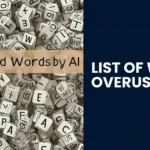Would you like to know how you can ask ChatGPT to provide you with information about diseases?
Despite not replacing expert medical knowledge, AI enables patients to better understand the symptoms, disease origins, and treatment options. No matter our efforts, the AI will remain useless unless we direct its decision-making through skillful questions. Throughout this guide, you’ll learn how to build the best ChatGPT prompts with clear examples, including why it’s valuable for responding to medical queries.
Table of Contents
- 1 Use ChatGPT to Access Helpful Disease Information
- 2 The Power of Asking the Right Questions
- 3 How to Create the Best Prompt for Asking ChatGPT About Diseases
- 4 Using ChatGPT for Medical Diagnosis: What You Need to Know
- 5 Top ChatGPT Medical Diagnosis Prompts
- 5.1 General Symptom Analysis
- 5.2 Explanation of a Specific Disease
- 5.3 Preventive Health Advice
- 5.4 Disease Comparison
- 5.5 Chronic Disease Management
- 5.6 Early Warning Signs
- 5.7 Pediatric Health Concerns
- 5.8 Impact of a Disease on Specific Demographics
- 5.9 Lifestyle Adjustments for Disease Prevention
- 5.10 Medical Research and Innovations
- 6 Final Thoughts
Use ChatGPT to Access Helpful Disease Information
ChatGPT processes natural language input and outputs for precise organized medical information as an AI system. This system provides reliable answers about various subjects, including healthcare information. Despite lacking medical expertise, ChatGPT delivers practical information about disease symptoms and treatment alternatives plus strategies to manage medical conditions.
When you have basic health problems like headaches or sore throats, you can talk to ChatGPT about causes of these conditions along with treatment options and times to see a doctor. ChatGPT acts as a knowledgeable guide who explains medical subjects clearly to you. To benefit fully from ChatGPT, your questions need to be presented in a form the system can process.
The Power of Asking the Right Questions
The type of questions you ask determine how well ChatGPT performs its response. When your query lacks precision, ChatGPT delivers unsatisfactory information. When you pose the question “What is a headache?” the AI system responds with only standard information. When you ask ChatGPT to describe headache causes and management, it helps the system generate proper, detailed explanations.
When you provide precise specifications to ChatGPT through your input, it adapts its responses to match your stated requirements. Your detailed instructions on health questions help ChatGPT deliver better information.
You must have to understand what a prompt is in generative ai? After that, you have to understand the iteration in prompt engineering because it is an interative process.
How to Create the Best Prompt for Asking ChatGPT About Diseases
When you ask specific questions, you will receive precise information. When you frame your query as specific questions, the system can deliver better results. Ask a doctor about your child’s fever to find its sources. If your question is too vague, the AI might provide a general or less helpful answer. For example, asking, “What is a headache?” is too broad, so the AI might only provide a basic definition.
On the other hand, a question like, “What are the common causes of recurring headaches, and how can they be managed?” gives ChatGPT a clear direction to provide a more detailed and useful response. So, follow the ChatGPT best practices to create the best prompt for medical diagnosis. If you want to write your own prompts for asking ChatGPT about diseases, you must follow the prompt engineering frameworks.
Be Specific About Your Question
The importance of specifying in prompt engineering is crucial. Instead of asking general questions like, “What is fever?” try providing more context. For example:
“What are the possible causes of a fever in children, and when should a doctor be consulted?”
You get more useful results from the system because you provide detailed information. When you specify your questions, ChatGPT uses its resources to find the most relevant medical data.
Add Context to Your Query
Your exact case details make ChatGPT respond better to your query. For one week now I have felt constant fatigue alongside mild headaches. For example, if you’re asking about a symptom, include as much context as possible:
“I have been feeling fatigued for the past week and experiencing occasional headaches. How many plausible reasons could explain this development?”
Use Clear and Simple Language
Medical information can be complex, but ChatGPT is designed to break it down into simpler terms if you ask it to. Include phrases like:
- “Can you explain this in simple language?”
- “Break it down for someone with no medical background.”
Request Comparisons When Necessary
If you’re trying to differentiate between two conditions, ask for comparisons. For example:
“What are the differences between the symptoms of a cold and the flu?”
Using ChatGPT for Medical Diagnosis: What You Need to Know
The system demonstrates clear restrictions when used in medical settings forever. Though ChatGPT is useful, it has specific functional boundaries. Professional medical testing must occur to work with trained healthcare providers. The system delivers responses only from healthcare knowledge up to 2023 and may require recent healthcare updates to perform accurately. ChatGPT best serves to provide basic healthcare information and help decode medical words, plus create discussion topics for physician appointments. Talk to a licensed doctor when you have serious or urgent medical issues to handle.
When to Use ChatGPT for Medical Questions
ChatGPT is particularly helpful in the following situations:
- You want to learn about a condition before seeing a doctor.
- You need to understand a medical term or concept.
- You’re looking for basic lifestyle tips to improve your health.
Top ChatGPT Medical Diagnosis Prompts
General Symptom Analysis
"Act as an experienced medical professional with expertise in diagnosing diseases. I have been experiencing [specific symptoms, e.g., persistent headaches, nausea, and dizziness] for [duration, e.g., two weeks]. Analyze these symptoms, provide possible causes, and suggest whether I should seek medical attention or perform any preliminary tests."

Explanation of a Specific Disease
"Act as a medical educator and explain [specific disease, e.g., multiple sclerosis] in detail. Cover its causes, symptoms, risk factors, diagnostic methods, and treatment options. Provide the explanation in layman’s terms so someone without a medical background can understand it clearly."
Preventive Health Advice
"Act as a healthcare consultant focused on preventive care. Provide a comprehensive guide to preventing [specific disease, e.g., heart disease], including dietary changes, physical activities, stress management techniques, and regular health screenings. Include practical tips that can be implemented easily in daily life."

Disease Comparison
"Act as a comparative medical expert. Compare [disease 1, e.g., COVID-19] and [disease 2, e.g., seasonal flu] in detail. Highlight the differences in symptoms, transmission methods, diagnostic approaches, and treatment options. Provide clear examples to help distinguish between the two conditions."
Chronic Disease Management
"Act as a chronic disease management specialist. I have been diagnosed with [specific condition, e.g., Type 1 diabetes]. Provide a detailed plan for managing this condition, including medication routines, dietary recommendations, exercise tips, and strategies for handling complications."
Early Warning Signs
"Act as an emergency medicine specialist. Provide a detailed explanation of the early warning signs of [specific critical condition, e.g., stroke]. Include how to recognize these signs, what immediate actions to take, and how these actions can improve outcomes."
Pediatric Health Concerns
"Act as a pediatrician specializing in childhood diseases. My child has been experiencing [specific symptoms, e.g., high fever, rash, and lethargy]. What could be the possible causes, and what immediate steps should I take to ensure their health and safety?"
Impact of a Disease on Specific Demographics
"Act as a specialist in geriatric medicine. Explain how [specific disease, e.g., osteoporosis] affects older adults differently than younger individuals. Include unique challenges they might face, special precautions to consider, and treatment options tailored for this demographic."
Lifestyle Adjustments for Disease Prevention
"Act as a wellness coach with medical knowledge. Suggest a detailed lifestyle plan to prevent [specific disease, e.g., hypertension]. Include tips on nutrition, physical activity, sleep habits, and stress management. Provide specific examples of meals, exercises, and relaxation techniques."
Medical Research and Innovations
"Act as a medical researcher specializing in innovative treatments. Provide detailed information about the latest advancements in [specific disease, e.g., cancer] treatment. Include new therapies, diagnostic tools, and ongoing clinical trials that show promise for better outcomes."
Final Thoughts
ChatGPT can be a powerful tool for learning about diseases, understanding symptoms, and exploring medical topics. By using well-thought-out prompts for asking ChatGPT about diseases, you can get clear, helpful, and customized answers to your health-related questions.
However, remember that ChatGPT is not a substitute for professional medical advice. Always consult a healthcare provider for accurate diagnosis and treatment. Use ChatGPT as a starting point to gather information, ask informed questions, and better understand your health. With the right prompts, you can make the most out of this AI tool while staying informed and empowered about your well-being.








